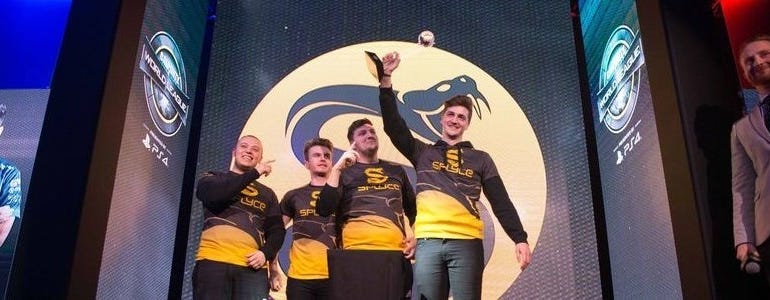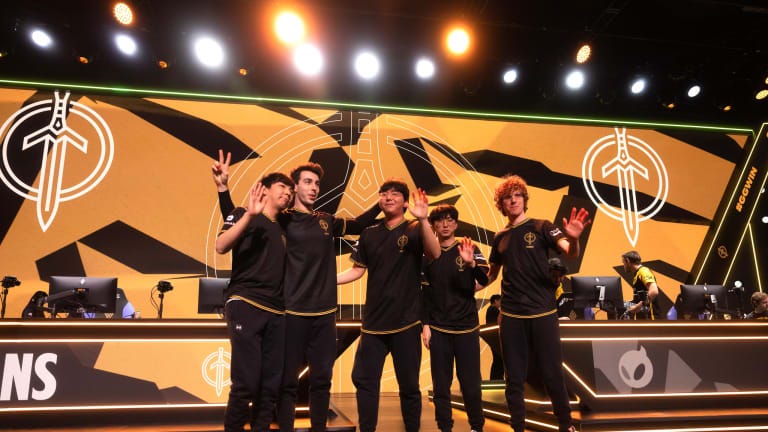There are few greater feelings in the world than this:
I’ve been lucky enough in my lifetime to have held a lot of trophies after we won them. Tournament championships in Starcraft 2, Halo and Gears of War. League championships in League of Legends and Call of Duty. World championships in Smite, Marvel vs. Capcom, World of Warcraft and Halo.
Let me tell you that I truly think I understand what it feels like to be a gambler after running a professional esports team. That high you get from winning - MY GOD is it addictive. And just like any high it’s very, VERY easy to become addicted to it. Everything revolves around it. You NEED to win.
It turns out losing feels the exact opposite: horrid. In the same way that the wins are so much bigger when it’s the team you’ve built doing the winning, the same goes for losing. Losing is SO MUCH WORSE when you’re invested at this level. It feels like your life is going to completely fall apart and you’ve failed everyone. Your entire identity and self-worth gets directly connected to team success and failure. It’s incredibly unhealthy and for the most part unavoidable.
This is a great example of what my head was like when I was running a team
I was so full of myself. Every trophy that we won just helped to reinforce that feeling. People around me told me how great I was doing. And so I found myself needing to keep feeding that huge ego. It was important to who I was. I imagine you’ll find these same huge egos across all sports ownership, no matter the sport. It kind of goes hand in hand with deciding to own a sports team.
Ego runs rampant in esports as it does in traditional sports. This idea probably isn’t revolutionary to you, but we usually think of it in terms of trash talk.
I’m here to talk about the bigger problem with ego - how it’s driving esports CEO’s to spend far beyond their means and even risk bankruptcy
I heard a smart person in esports once say something that sounds so simple, yet very few people really think about it’s implications:
Only one team gets to win.
In a league with ten or twenty teams, or sometimes more, the overwhelming majority of teams don’t come in first each year. Sometimes a single team wins everything. Sometimes different teams win various tournaments, yet the victory is short-lived and still held by only a single team during that timeframe.
Yet despite the fact that focusing on winning as a strategy for brand growth and economic success is clearly a losing strategy for almost every team, it ends up being the strategy of choice for most everyone. In esports, we don’t tend to have the Oakland A’s playing Moneyball or the Cleveland Browns just collecting a check and chugging along. Virtually every team is spending copious amounts of money trying to win championships. They may not be spending the money on the right players/staff/etc to get the championship in your opinion, yet they are spending it just the same.
And in the end, one team is holding the trophy. Just like it’s always been.
Franchise-like Leagues For Safety
When publishers like Riot and Activision/Blizzard started implementing franchise-like models for their leagues, it was in response to an outcry from teams about how we needed the safety of franchise-like leagues so we could invest for the long term. I will openly admit I was one of those people shouting for it, alongside my peers.
“Give us the safety of a closed league with a revenue share and we’ll become responsible citizens who help build a sustainable ecosystem!” we told them. The case was made that if they took away relegation and committed to a model that we could grow together over the years then teams wouldn’t have to spend absurd amounts of money on their teams just to make sure they didn’t relegate out of the league.
None of that turned out to be true. I know we all believed it at the time. It wasn’t like we were lying to the publishers and snickering aside to each other as we pulled one over on them. We truly thought we were going to become responsible spenders and grow in a healthy way alongside our peers in an ecosystem that supported our growth.
Instead, spending never stopped climbing. Organizations continued to raise huge amounts of venture capital on inflated valuations to feed budgets that were out of control. We all had these huge egos to feed and the best way to do that was to sign the best players to our teams to chase another trophy. So instead of looking at our budgets over the next five to ten years and thinking about how we’re going to build toward a sustainable enterprise, organizations were chasing the biggest names no matter what the cost. Then we could complain that the publishers weren’t doing enough to help us become sustainable. It was all their fault!!
The focus was on this year; on this trophy. Nothing had really changed.
Long Term Growth Mindset
There have been a few companies who have somehow managed to stave off the allure of winning at all costs. In some cases, the return on longer term investment has even paid off. Golden Guardians was praised this spring for focusing not on the biggest names, but rather building a team within a reasonable budget who could grow over time to compete. Eventually it led to their first season finals appearance and a spot at an international event. Whether this spending strategy was intentional or just a result of budgets being tight is unknown. The results still stand, either way.
The strategy is a sound one. Spend what you can afford to. You can do it like the Oakland A’s and try to outthink everyone else with your smaller budget or you can just accept mediocre results. In either example you are building toward long-term sustainability, rather than throwing all of your chips in for the potential ego boost that comes from a shiny trophy at the end of the rainbow.
Championship glow is fleeting. It fades away super fast. In it’s wake we find financial devastation that was always preventable.
I know, I made these same mistakes over and over again…






